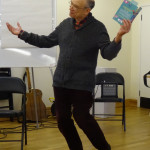Hello Liz. Welcome to the Poetry Zone. So, let’s start with the BIG QUESTION. Why do you write poetry?
I have a skittering mind. It jumps from subject to subject and gets bored easily. I couldn’t possibly write anything as long as a book. When I write a poem I feel restless and frustrated until I get to the end and begin the good part, the editing and making it the best it can be. Imagine feeling restless and frustrated until you’d written 35,000 words!
Do you have a special place to write?
I have two favourite places to write. One is in my living room on the sofa, with my laptop to research things, my legs up, lots of books by my side and cushions behind my back. I often wake up with the pen in my hand, half way through a line. My other favourite place is in front of the computer in my study, surrounded by bookshelves. Strangely, I get a lot more work done in this place. It is mystifying.
Where can we see your poems?
In about 70 anthologies. My first book, called Animal Magic, Poems on a Disappearing World, IRON Press, is all about endangered animals. Reaching the Stars, Poems about Extraordinary Women and Girls, Macmillan, written with poet friends Jan Dean and Michaela Morgan, is a collection of poems celebrating the incredible feats and strengths and intelligence and bravery of women from the beginning of history until now. The Same Inside, Poems about Empathy and Friendship, Macmillan, written with Rogers Stevens and Matt Goodfellow, is a warm and gentle collection of poems about all that is wonderful about empathy and tolerance and kindness. And Apes to Zebras, an A-Z of Shape Poems, Bloomsbury, written with Sue-Hardy Dawson and Roger Stevens, contains shape poems about some of the incredible and beautiful animals we share the world with.
Do you write many shape poems?
Yes! Some of my first poems were shape poems. I love writing them – sometimes I just see the poem as a shape and that’s how it has to be written. They take a long, painstaking, but curiously satisfyingly time!
How long does it take to write a poem or a book?
As long as it takes. Sometimes a poem writes itself out of the end of my arm onto the page as if it was written already, and it needs no editing at all. I think that’s usually, although not always, when I’ve been thinking about the subject a lot. Sometimes I can’t get something right and the poem needs to rest for a year or more before I suddenly know how to make it sing. Shape poem books take a long, long time!
Are you writing anything at the moment?
I’m always writing!
Why is it important to visit schools and help young people write poems?
There’s a direct link between enjoyment and the ability to take in information and I love the fact that after one of my sessions the children have such fabulous questions to ask, such a detailed memory of what I have said and such enthusiasm to start writing a poem of their own. Young people can recognise their own feelings, desires, and needs in a poem, and poems give them the words and freedom to express themselves.
Did you enjoy school?
No. I went to 9 schools before I was 11 and was ‘new’ at most of them. I found it difficult to make friends, and my self-confidence was knocked by the fact that everyone else knew where to go and what to do and how to do things, when I didn’t.
What was your favourite poem as a child?
My absolute favourite poem as a child was Overheard on a Saltmarsh by Harold Monro. It still brings up goosebumps on my arms.
Of all the poems you’ve written, which is your favourite?
My favourite is always the one I’ve just written. But on the whole I like the animal ones best! Two short ones I’m fond of are Pygmy Shrew and Sloth. Sloth appears as a shape poem in Apes to Zebras, An A-Z of Shape Poems.
Pygmy Shrew
A pygmy shrew
is minuscule
and very hard to seek,
for it’s true the
pygmy shrew’s
just whiskers,
nose and squeak.
Sloth
He hangs from aloft
infested by moths,
and his face has
no forehead or chin,
but he carries this off,
the lovable sloth,
for his rest is
a hug and a grin.
What did you do before becoming a poet?
I worked at The Film Editors, which used to be part of Ridley Scott Associates. We edited adverts and sometimes films. Then I was a mum.
Have you any pets?
I have a cat called Milla who is very clever and likes to trip us up in a bid to bring us down to her level so she can sit on us, and an assistance dog, Lola, who goes with me everywhere (even to schools!). She alerts me if I my blood sugar is going low, and this gives me time to have some glucose.
What advice would you give to young poets?
Read, read, read. Poetry of course, but also everything else. You or your teachers and schools can keep up with what is going on in the poetry world by following the blog http://www.poetryroundabout.com, where advice for young poets and competitions for young people are often posted. Teachers might also like to follow @kidspoetsummit or @lizpoet on Twitter. We retweet all young people’s poems sent!
Here is my blog:
http://www.lizbrownleepoet.com
My website:
http://www.poetlizbrownlee.co.uk
My Twitter feed:
And finally – what makes you happy about being a poet?





